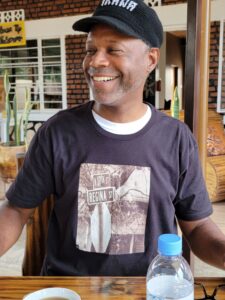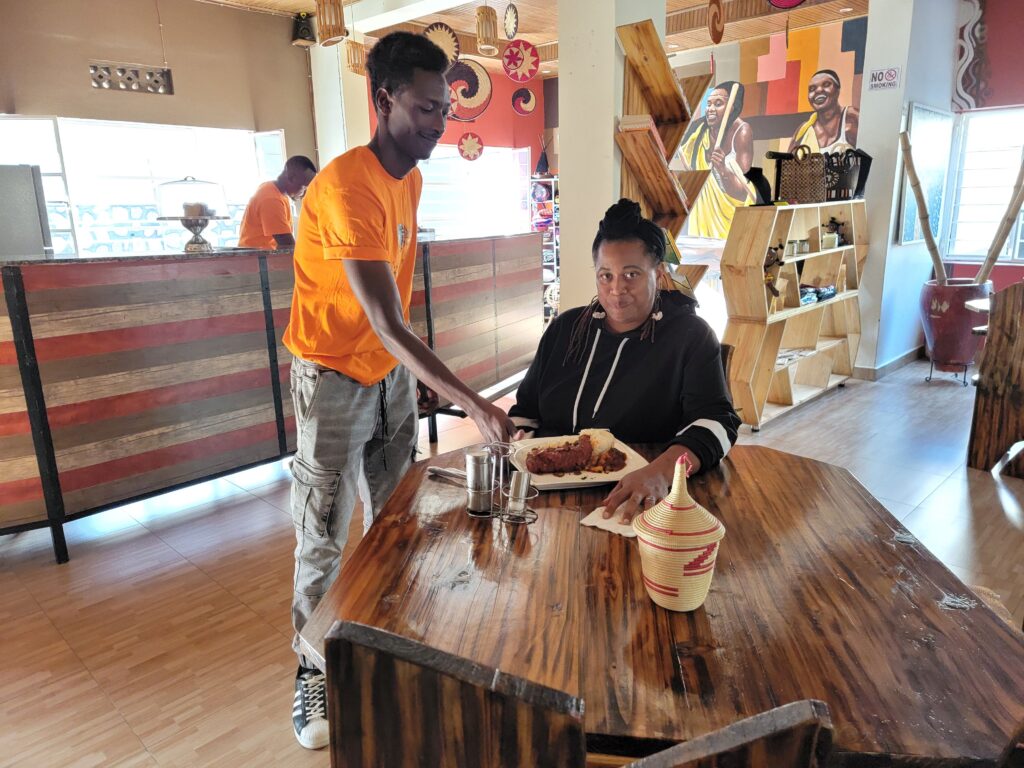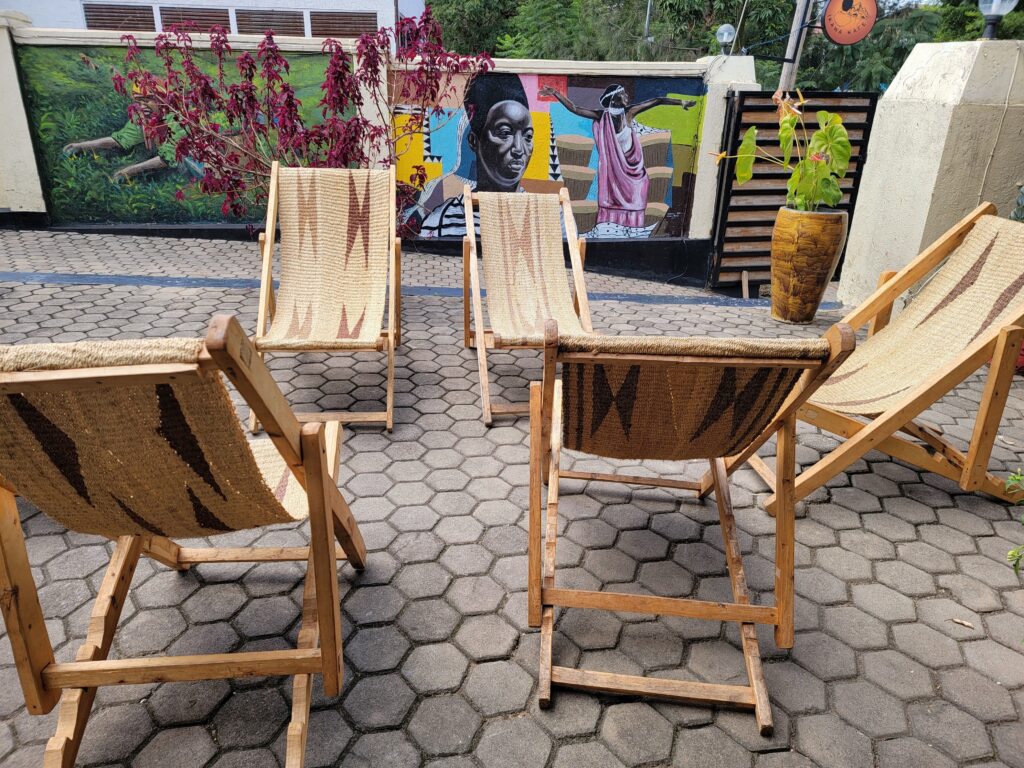“Your home will always be the place for which you feel the deepest affection, no matter where you are.” Proverb

On a particularly bright, sunny, warm afternoon six days after I arrived in Rwanda, I spent a leisurely afternoon with my twin sister Colette in Ikawa Kafe, speaking with its proprietors Adilah and LaMont Muhammad, African-American “refugees” who have chosen to make their home in the land of a thousand hills.
“I still can’t believe we are here,” said Adilah.
The pair had been scanning the African continent for a place to live. “Rwanda was not even on our radar,” LaMont said, adding, “We had no clue it was what it is.”
A place where they say they were welcomed in a way they had never experienced before.
They had been following an African-American family of three dubbed the Unapologetic Nomads on YouTube. What was being transmitted about Rwanda got their attention.
However, it was the brutal murder of George Floyd that changed their casual search to an imperative. “I woke up screaming into my pillow,” Adilah said, “I’m done.”

Nine months later they made their first trip to Rwanda. It was January 2021 and the rainy season. Adilah said she had second thoughts. “It was dangerously muddy and I was really cold. We weren’t sure it could meet the needs of the family we were bringing with us.”
It would be the way she was welcomed into a Rwandan home and family on that first trip that got her past her concerns. The Muhammads are Muslims and very “spiritual people,” LaMont said. The deep warmth and welcoming they felt “was the sign we needed.” But they both agreed there was something else nearly as powerful.
The couple were shocked after coming from a deeply divided America by how every Rwandan they met spoke glowingly and with great pride about their homeland and their president, Paul Kagame. And with good reason, they both agreed.
“We knew of the trauma Rwandans had experienced in the genocide.” Adilah said it was unbelievable how the country had risen from that unthinkable travesty.
And while she doesn’t compare her life in America in any way to the 100-day bloodbath in 1994 when 1 million Tutsis and their Hutu sympathizers were slaughtered, Adilah has experienced her own trauma.
Unable to afford healthcare as a small business owner, she said she was living with physical and health conditions that she could not afford to have diagnosed. After coming to Rwanda she was able to afford the tests and care that she needed because of Rwanda’s progressive healthcare system that makes care easily accessible for everyone. (See “In Rwanda, Health Care Coverage That Eludes the U.S.”)
“We don’t realize how broken we are coming from America.”
But there are some things that are obvious about the brokenness, not least of which is the “blowing up of children in our schools,” Adilah said.
Their two granddaughters, who are first cousins, are both preteens. Their parents remained in the states working, while their grandparents brought them to a place where the pair can walk around the streets without fear of being shot.
It is only one of the many laws that govern the country that no one in Rwanda is allowed to have weapons of any kind.
When asked what they found to be the biggest challenge in their new home the two girls both said, almost in unison, “cold showers.” And while big bathtubs full of hot water are elusive for them, friends are not.
They verged on giddy while talking about all the new chums they had made at school.

The Muhammads are not the only African-Americans who have found or are finding their way to Rwanda.
During our leisurely three-hour visit over a delicious lunch and spiced tea, a number of expats made their way into the Afro-centric restaurant and café the Muhammads have created. They were greeted warmly and clearly found Ikawa Kafe a comfortable haven, complete with African-themed artwork, murals, and locally made tables and chairs. (Ikawa means coffee in kinyarwanda, by the way.)
At one point a woman dressed in traditional African garb with matching brown and yellow head wrap found a table next to us and we struck up a conversation. Rosa was on her second fact-finding trip to Rwanda. She had been in the country for two months this time.
Hailing from St. Louis, at 52 Rosa said the hardest part about her decision was leaving family behind. It was clear, however, that she had made the decision. “Yes,” she said when the determined look on her face made me ask if she had made up her mind. “I am going to do it.”
A few nights later we decided to go to a buffet and live music evening back at Ikawa Kafe. This time patrons were gathered in the street where tables had been set up and the band was playing. A notably long table was occupied by a group of 18 to 20 exceptionally lively, mostly middle-aged and above women dressed in colorful batik kaftans. By their accents it seemed likely they were part of the African-American community that Adilah and LaMont had attracted to the restaurant.
It wasn’t long before twin Sister Colette engaged one of the women seated at the head of the table. Not meeting with much success talking across the walkway and over the band and din of chatter IMAHKÜS Nzingah Okofu, aka Mama One Africa, joined us. She told us she had escaped “corporate America” more than 30 years ago to Ghana where she made her home until discovering Rwanda a few years earlier. It didn’t take her long to develop a women’s economic empowerment initiative in the country: Rweru Women’s Economic Empowerment Initiative. While IMAHKÜS still had a business and some initiatives in Ghana, she seemed very comfortable at the head of the table of women who had also escaped from America to make their home in the safety and warmth of Kigali.
The night before I left my adopted country of Rwanda, I held a combination birthday party for my Rwanda son Peter and my adopted twin sister’s husband, Mike, and going away party back at Ikawa. As we arrived early, we had a chance to chat with yet another African-American couple who had found refuge in Rwanda a few years earlier from Virginia. The couple, who said they lived outside of Washington, D.C., also said they had found peace in their new home.
“It is only the driving that is taking some getting used to,” the husband said. But, they were determined to do it and had committed to that task by bringing both of their cars from the United States into Rwanda. “We drove for a living back there,” the husband said. “We’ll get used to this.”
On the day of our first meeting, Adilah recalled how 90 days after the first visit in January they arrived with their two mothers and two granddaughters and not much more.
“We were like any refugees,” Adilah said. What made them different from day one was the reception they received at the airport upon their return by the people they had come to know three months earlier. “They came to greet us as if we were coming home,” Adilah said.
Editor’s Note: Read a “Rwanda Journal 2022: A Mystical Journey Part I” here.





